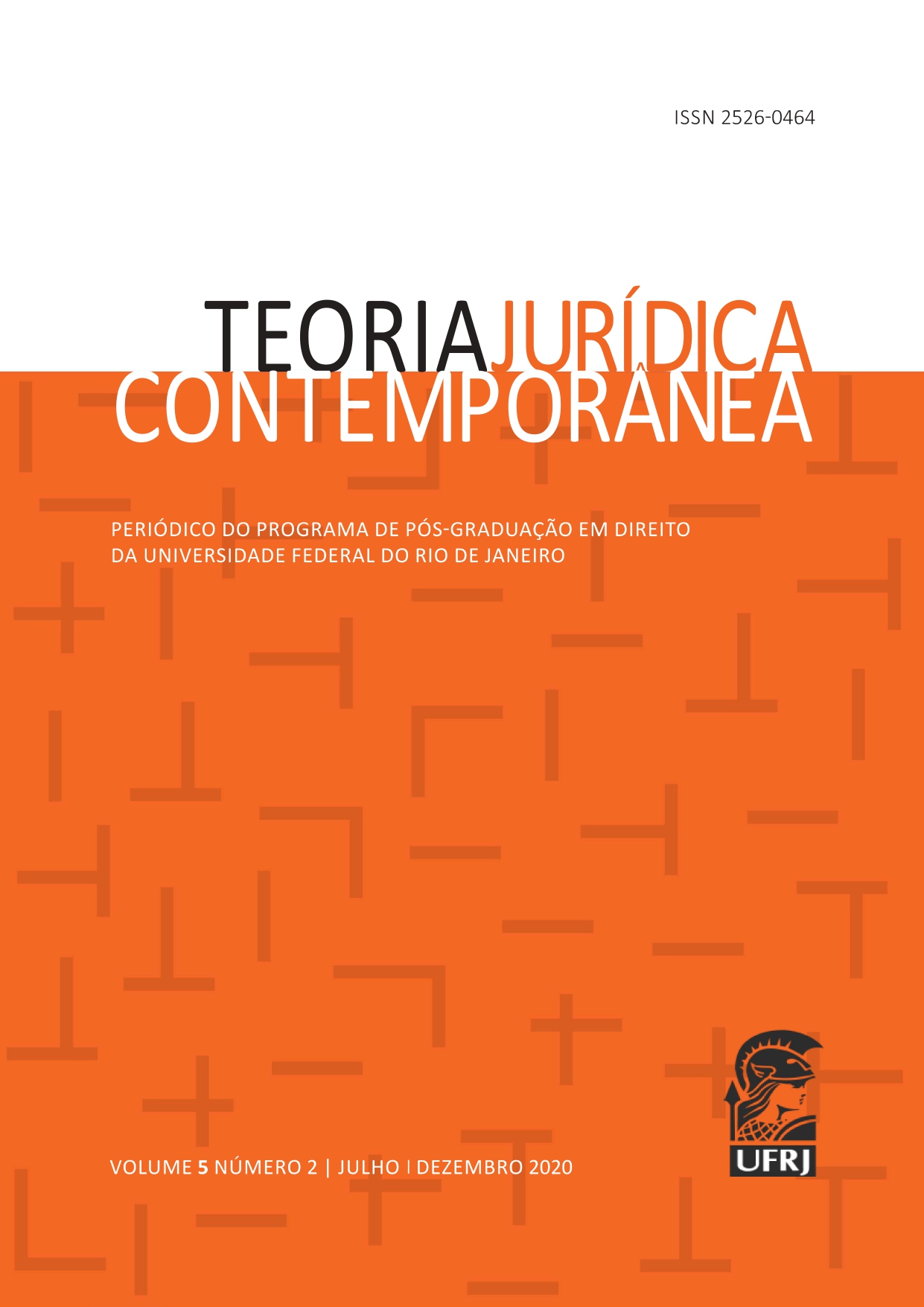Legal protection for same-sex couples: its foundation in the Bolivian democratic constitution of 2009
DOI:
https://doi.org/10.21875/tjc.v5i2.27943Keywords:
Constituent Power, Democratic Constitution, New Latin American Constitutionalism, Control of Conventionality, Constitutionalized guidelines for the interpretation of rights, Legal protection for Same-sex couplesAbstract
ABSTRACT:
The Bolivian Constitution of 2009, which supports a democratic constitutionalism in the Latin American sphere, introduces effective mechanisms for the protection of minority rights: Constitutionalized guidelines for the interpretation of rights and the exercise of control of conventionality. These guidelines emerge from a democratic constituent power respectful of the evolution of fundamental rights, for this reason they are mandated to be complied with by the public servants and authorities that are part of the constituted bodies, among them, the Plurinational Constitutional Court. Based on these guidelines for interpretation, the rights of same-sex couples find shelter and protection in the Bolivian legal system. In this framework, art. 63 of the Constitution makes sense in accordance with the constitutional block, so that, in exercising conventional control, the judicial authorities must directly and preferentially apply Advisory Opinion 24/17 issued by the Inter-American Court of Human Rights, and; therefore, equal legal protection must be provided internally to samesex couples.
Downloads
References
ANDALUZ VEGACENTENO, H. (2014). Acción de inconstitucionalidad. Consultado 21-Jul- 2014. Recuperado de: http://econstitucional.com/ensayos/Acci%C3%B3n%20de%20insconstitucionalidad,%20H.%20Andaluz.pdf.
ATTARD BELLIDO, M E. (2017). Argumentación y juzgamiento con perspectiva de despatriarcalización. La Paz, Bolivia: Fundación Construir.
COMISIÓN INTERAMERICANA DE DERECHOS HUMANOS, 2018. Informe disponible en: http://www.oas.org/es/cidh/informes/pdfs/violenciapersonaslgbti.pdf
CONSTITUCIÓN BOLIVIANA, 2009. Constitución Política del Estado (CPE) (7-Febrero-2009). Disponible en: https://sea.gob.bo/digesto/CompendioNormativo/01.pdf
CORTE INTERAMERICANA DE DERECHOS HUMANOS. Opinión Consultiva Oc-24/17, de 24 de noviembre de 2017. Solicitada Por La República De Costa Rica Identidad De Género, E Igualdad Y No Discriminación A Parejas Del Mismo Sexo. Disponible en: http://corteidh.or.cr/docs/opiniones/seriea_24_esp.pdf
CORTE INTERAMERICANA DE DERECHOS HUMANOS, Caso Almonacid Arellano vs. Chile, parr. 123. Disponible en: http://www.corteidh.or.cr/docs/casos/articulos/seriec_154_esp.pdf
CORTE INTERAMERICANA DE DERECHOS HUMANOS. Sentencia Trabajadores cesados vs. Perú parr. 158. Disponible en: http://www.corteidh.or.cr/docs/casos/articulos/seriec_158_esp.pdf
CORTE INTERAMERICANA DE DERECHOS HUMANOS. Caso Cabrera García vs. México. Disponible en: http://www.corteidh.or.cr/CF/jurisprudencia2/ficha_tecnica.cfm?nId_Ficha=343
FERRAJOLI, L. (2014). La democracia a través de los derechos. El constitucionalismo garantista como modelo teórico y como proyecto político. Madrid, España: Editorial Trotta. Trad. Perfecto Andrés Ibañez.
KALYVAS, A. (2005). Soberanía popular, democracia y el poder constituyente. Política y gobierno. XII (1), 91-124.
LASALLE, F. (1989) ¿Qué es una Constitución?. Barcelona, España: Ariel.
MARTÍNEZ DALMAU, R. (2012). El ejercicio del poder constituyente en el nuevo constitucionalismo. Revista General de Derecho Público Comparado (11), 1-15. Recuperado de: https://www.academia.edu/1803158/El_ejercicio_del_poder_constituyente_en_el_nuevo_constitucionalismo
PRIETO SANCHIS, L. (2002). Neoconstitucionalismo y ponderación judicial. En Derechos fundamentales, neoconstitiucionalismo y ponderación judicial, Lima- Perú: Palestra Editores.
PISARELLO, G. (2014). Procesos Constituyentes. Caminos para la Ruptura Democrática. Madrid, España: Editorial Trotta.
SCHAVELSON, S. (2012). El nacimiento del Estado Plurinacional de Bolivia. Etnografía de una Asamblea Constituyente. La Paz, Bolivia: Editorial Plural.
ZANKYS G., S. (2014). Los presupuestos constitucionales para la interpretación de la ley y la valoración de la prueba. Documento presentado para la Escuela de Jueces en el Curso semipresencial: “Valoración de la prueba y redacción de Resoluciones en materia agroambiental”. Versión en PDF.
VICIANO R. P. Y MARTÍNEZ DALMAU R. (2013), La Constitución democrática, entre el neoconstitucionalismo y el nuevo constitucionalismo. En El Otro Derecho, 48, 63-84. Recuperado de: https://www.academia.edu/9744793/_La_Constituci%C3%B3n_democr%C3%A1tica_entre_el_neoconstitucionalismo_y_el_nuevo_constitucionalismo_en_El_Otro_Derecho_no_48_2013_p%C3%A1gs._63-84._Con_Roberto_Viciano_Pastor
TRIBUNAL SUPREMO DE JUSTICIA DEL ESTADO PLURINACIONAL DE BOLIVIA. Protocolo para juzgar con perspectiva de género. http://tsj.bo/wp-content/uploads/2014/03/Protocolo-de-Genero-FINAL_Optimize.pdf
Downloads
Published
Issue
Section
License
The authors who publish in this journal agree with the following terms:
1. The authors maintain the copyright and grant the journal the right of first publication, with the work simultaneously licensed under the Creative Commons Attribution License that allows the sharing of the work with recognition of authorship and initial publication in this journal.
2. Authors are allowed to assume additional contracts separately, for non-exclusive distribution of the version of the work published in this journal (e.g., publishing in an institutional repository or as a book chapter), with acknowledgment of authorship and initial publication in this journal.
3. Authors are allowed and encouraged to publish and distribute their work online (e.g., in institutional repositories or as a personal page) at any point before or during the editorial process, as this may generate productive changes, as well as increase the impact and citation of the published work (See The Effect of Open Access).

This work is licensed under a Creative Commons Attribution-ShareAlike 3.0 Brazil License.

